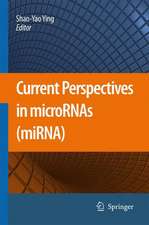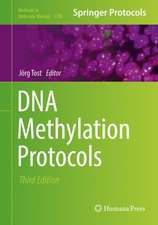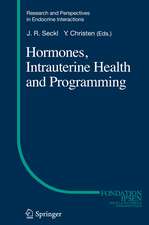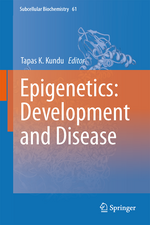The Biochemistry of Retinoid Signaling II: The Physiology of Vitamin A - Uptake, Transport, Metabolism and Signaling: Subcellular Biochemistry, cartea 81
Editat de Mary Ann Asson-Batres, Cecile Rochette-Eglyen Limba Engleză Paperback – 24 apr 2018
The role of vitamin A in living organisms has been known throughout human history. In the last 100 years, the biochemical nature of vitamin A and its active derivative, retinoic acid, its physiological impact on growth processes, and the essential details of its mechanism of action have been revealed by investigations carried out by researchers using vertebrate and more recently invertebrate models to study a multiplicity of processes and conditions, encompassing embryogenesis, postnatal development to old age. A wealth of intercellular interactions, intracellular signaling systems, and molecular mechanisms have been described and the overall conclusion is that retinoic acid is essential for life. This book series, with chapters authored by experts in every aspect of this complex field, unifies the knowledge base and mechanisms currently known in detailed, engaging, well-illustrated, focused chapters that synthesize information for each specific area.
In view of the recent information explosion in this field, it is timely to publish a contemporary, comprehensive, book series recapitulating the most exciting developments in the field and covering fundamental research in molecular mechanisms of vitamin A action, its role in physiology, development, and continued well-being, and the potential of vitamin A derivatives and synthetic mimetics to serve as therapeutic treatments for cancers and other debilitating human diseases.
Volume II is divided into nine chapters contributed by prominent experts in their respective fields. Each chapter starts with the history of the area of research. Then, the key findings that contributed to development of the field are described, followed by a detailed look at key findings and progress that are being made in current, ongoing research. Each chapter is concluded with a discussion of the relevance of the research and a perspective on missing pieces and lingering gaps that the author recommends will be important in defining future directions in vitamin A research.
| Toate formatele și edițiile | Preț | Express |
|---|---|---|
| Paperback (1) | 1379.21 lei 6-8 săpt. | |
| SPRINGER NETHERLANDS – 24 apr 2018 | 1379.21 lei 6-8 săpt. | |
| Hardback (1) | 1385.19 lei 6-8 săpt. | |
| SPRINGER NETHERLANDS – 17 noi 2016 | 1385.19 lei 6-8 săpt. |
Din seria Subcellular Biochemistry
- 18%
 Preț: 948.79 lei
Preț: 948.79 lei - 5%
 Preț: 1456.88 lei
Preț: 1456.88 lei - 18%
 Preț: 1373.84 lei
Preț: 1373.84 lei - 18%
 Preț: 1243.78 lei
Preț: 1243.78 lei - 18%
 Preț: 2098.81 lei
Preț: 2098.81 lei - 18%
 Preț: 1122.10 lei
Preț: 1122.10 lei - 5%
 Preț: 1160.63 lei
Preț: 1160.63 lei - 18%
 Preț: 1396.26 lei
Preț: 1396.26 lei - 18%
 Preț: 1114.96 lei
Preț: 1114.96 lei - 18%
 Preț: 1224.68 lei
Preț: 1224.68 lei - 18%
 Preț: 951.29 lei
Preț: 951.29 lei - 18%
 Preț: 1227.99 lei
Preț: 1227.99 lei -
 Preț: 398.15 lei
Preț: 398.15 lei -
 Preț: 399.88 lei
Preț: 399.88 lei - 18%
 Preț: 1231.47 lei
Preț: 1231.47 lei - 18%
 Preț: 1230.35 lei
Preț: 1230.35 lei -
 Preț: 392.60 lei
Preț: 392.60 lei - 18%
 Preț: 1231.47 lei
Preț: 1231.47 lei - 15%
 Preț: 638.76 lei
Preț: 638.76 lei - 5%
 Preț: 656.26 lei
Preț: 656.26 lei -
 Preț: 389.49 lei
Preț: 389.49 lei - 5%
 Preț: 659.19 lei
Preț: 659.19 lei -
 Preț: 392.37 lei
Preț: 392.37 lei - 5%
 Preț: 662.09 lei
Preț: 662.09 lei -
 Preț: 395.09 lei
Preț: 395.09 lei - 5%
 Preț: 667.99 lei
Preț: 667.99 lei -
 Preț: 400.47 lei
Preț: 400.47 lei - 18%
 Preț: 1224.54 lei
Preț: 1224.54 lei - 15%
 Preț: 647.73 lei
Preț: 647.73 lei - 15%
 Preț: 646.75 lei
Preț: 646.75 lei - 5%
 Preț: 662.30 lei
Preț: 662.30 lei -
 Preț: 395.25 lei
Preț: 395.25 lei - 18%
 Preț: 1230.21 lei
Preț: 1230.21 lei - 18%
 Preț: 1231.95 lei
Preț: 1231.95 lei - 18%
 Preț: 964.54 lei
Preț: 964.54 lei
Preț: 1379.21 lei
Preț vechi: 1681.96 lei
-18% Nou
Puncte Express: 2069
Preț estimativ în valută:
263.95€ • 274.55$ • 217.90£
263.95€ • 274.55$ • 217.90£
Carte tipărită la comandă
Livrare economică 15-29 aprilie
Preluare comenzi: 021 569.72.76
Specificații
ISBN-13: 9789402414448
ISBN-10: 9402414444
Ilustrații: IX, 263 p. 53 illus., 41 illus. in color.
Dimensiuni: 155 x 235 mm
Greutate: 0.39 kg
Ediția:Softcover reprint of the original 1st ed. 2016
Editura: SPRINGER NETHERLANDS
Colecția Springer
Seria Subcellular Biochemistry
Locul publicării:Dordrecht, Netherlands
ISBN-10: 9402414444
Ilustrații: IX, 263 p. 53 illus., 41 illus. in color.
Dimensiuni: 155 x 235 mm
Greutate: 0.39 kg
Ediția:Softcover reprint of the original 1st ed. 2016
Editura: SPRINGER NETHERLANDS
Colecția Springer
Seria Subcellular Biochemistry
Locul publicării:Dordrecht, Netherlands
Cuprins
Preface, Mary Ann Asson-Batres and Cecile Rochette-Egly.- In Memorium.- 1 Carotenoids and Retinoids: Nomenclature, Chemistry, and Analysis, Earl H. Harrison and Robert W. Curley, Jr.- 2 Functions of Intracellular Retinoid Binding-Proteins, Joseph L. Napoli.- 3 Vitamin A Transport and Cell Signaling by the Retinol-Binding Protein Receptor STRA6, Noa Noy.- 4 Vitamin A Absorption, Storage and Mobilization, William S. Blaner, Yang Li, Jason J. Yuen, Seung-Ah Lee, and Robin D. Clugston.- 5 Retinoic Acid Synthesis and Degradation, Natalia Y. Kedishvili.- 6 Cellular Retinoic Acid Binding Proteins: Genomic and Non-Genomic Functions and their Regulation, Li-Na Wei.- 7 Non-Classical Transcriptional Activity of Retinoic Acid, Noa Noy.- 8 Vitamin A as PKC Co-factor and Regulator of Mitochondrial Energetics, Ulrich Hammerling.- 9 Vitamin A and Vision, John C Saari.- Index.
Textul de pe ultima copertă
The role of vitamin A in living organisms has been known throughout human history. In the last 100 years, the biochemical nature of vitamin A and its active derivative, retinoic acid, its physiological impact on growth processes, and the essential details of its mechanism of action have been revealed by investigations carried out by researchers using vertebrate and more recently invertebrate models to study a multiplicity of processes and conditions, encompassing embryogenesis, postnatal development to old age. A wealth of intercellular interactions, intracellular signaling systems, and molecular mechanisms have been described and the overall conclusion is that retinoic acid is essential for life. This book series, with chapters authored by experts in every aspect of this complex field, unifies the knowledge base and mechanisms currently known in detailed, engaging, well-illustrated, focused chapters that synthesize information for each specific area.
In view of the recent information explosion in this field, it is timely to publish a contemporary, comprehensive, book series recapitulating the most exciting developments in the field and covering fundamental research in molecular mechanisms of vitamin A action, its role in physiology, development, and continued well-being, and the potential of vitamin A derivatives and synthetic mimetics to serve as therapeutic treatments for cancers and other debilitating human diseases.
Volume II is divided into nine chapters contributed by prominent experts in their respective fields. Each chapter starts with the history of the area of research. Then, the key findings that contributed to development of the field are described, followed by a detailed look at key findings and progress that are being made in current, ongoing research. Each chapter is concluded with a discussion of the relevance of the research and a perspective on missing pieces and lingering gaps that the author recommends will be important in defining future directions in vitamin A research.
Caracteristici
Provides a history of vitamin A research from earliest knowledge to the present Provides up-to-date descriptions of all aspects of vitamin A uptake, transport and utilization in mammalian systems Provides an overview of vitamin A related molecules and processes that have recently been shown to be present in non-mammalian and invertebrate systems Provides an overview of the role of vitamin A in vision






















